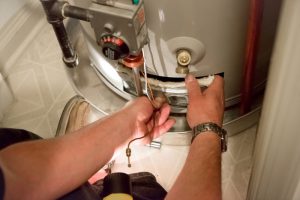Corrosion and Sediment in Your Water Heater
 Among the factors that determine the quality of your water, one of them is the region you live in. Unless you have a water filtration system, the city can only do so much to purify your water before it gets to your home. New Mexico happens to be one of the states with the hardest water in the nation.
Among the factors that determine the quality of your water, one of them is the region you live in. Unless you have a water filtration system, the city can only do so much to purify your water before it gets to your home. New Mexico happens to be one of the states with the hardest water in the nation.
So how does this tie into your water heater? Minerals, whether they tend to corrode or buildup, both have the ability to damage your water heater if not treated with routine maintenance. We’ll look at just a few examples of how corrosion and sediments can be cause enough for concern to call a Toas plumbing service.
Flushing the Tank to Remove Sediment
When it comes to tank water heaters, there’s one drawback to storing all the water in a big tank: it also comes with all the minerals in that water. As these minerals build up over time, they’ll float to the bottom of the tank, which is what plumbers call “sediment.”
Sediment builds up into a layer at the bottom of the tank. Of course, the heater for the tank is also located at the bottom. The sediment forms a barrier between the heater and the water, and it can result in individual spots that become very hot. So hot, in fact, that it can damage the tank and contribute to a leak.
Too much sediment can also drive up energy costs. This is due to similar reasons as above—the barrier of sediment prevents the water from being heated, meaning it takes longer to get water at the temperature you’re used to. Higher energy bills shortly after.
Anode Rod
The water is naturally full of several corrosive elements. Without any kind of protection, the water tank would soon be corroded by them. That’s why every tank comes equipped with an anode rod.
The anode stays in the water and attracts all the corrosive elements to it. However, it can only handle so much. Over time, it will collect too much buildup and become useless. It takes about 5 years to get to this point.
If you forget about the anode rod after it’s time to replace it, you run the risk of damaging your water tank. Proper maintenance to inspect and replace the anode rod can extend the life of your heater from years, and it will save you from having to buy an entirely brand new water heater.
Scaling in Tankless Water Heaters
Due to the fact that tankless water heaters don’t have tanks, it’s commonly thought that they can’t be subject to corrosion or buildup. Unfortunately, this is a misconception.
You’ve most likely heard the terms “hard water” and “soft water.” The harder the water is, the more it contains minerals like magnesium and calcium that contribute to buildup in pipes and appliances. This buildup is called “scaling,” and in a tankless water heater, it can build up on the heat exchanger.
The heat exchanger, of course, is what helps the tankless heater create hot water. If this component is compromised by scaling, it won’t perform nearly as well as it should. If it’s forced to compensate for too long, it can create a spike in your energy bill. It’s also possible it can overwork to the point of breaking down.
We offer professional water filtration services in the following locations:
- Santa Fe
- Los Alamos
- White Rock
- And more!
Contact Santa Fe Express for water heater repair and maintenance. Why wait for service when you can get it Express?

